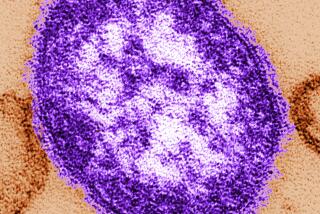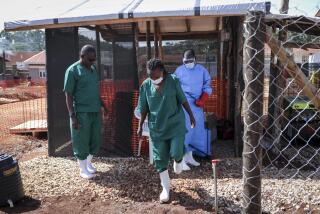Second American Ebola patient arrives in Atlanta for treatment
- Share via
Reporting from New York — A woman in Ohio and two men in New York City are among a handful of people in the United States who have been tested for Ebola this week as healthcare facilities go on high alert because of the deadly outbreak in West Africa.
A second American aid worker who contracted the virus in Liberia arrived in Atlanta by air ambulance Tuesday. Nancy Writebol, 59, will be treated at Emory University Hospital along with a medical doctor who arrived from Liberia on Saturday.
The president of SIM, the Christian group Writebol works with, said that before the flight left Liberia, the missionary was able to eat some yogurt and walk onto the plane. Writebol’s husband, David, who remains in Liberia, had been able to speak to his wife only through a window there to protect him from infection, SIM President Bruce Johnson said at an Atlanta news conference.
“A week ago, we were thinking about possible funeral arrangements,” Johnson, who fought back tears, quoted David Writebol as saying. “Now we have a real reason to be hopeful.”
Nancy Writebol will be treated for Ebola alongside Dr. Kent Brantly, 33.
“I have been able to see Kent every day,” Brantly’s wife, Amber, said Tuesday, “and he continues to improve.”
Johnson, asked about the thinking behind bringing the two to the U.S., said he hoped research into their cases here could lead to a breakthrough in fighting the disease, which has killed nearly 900 people in Liberia, Sierra Leone, Guinea and Nigeria since March. The two already received doses of an experimental serum in Liberia, but it is not known whether that has affected their conditions.
“This could possibly be an opportunity for Emory Hospital to help understand what’s going on and find a cure,” Johnson said after Writebol was wheeled into Emory on a stretcher. “That would be incredible.”
Brantly and Writebol are the only known Ebola patients in the U.S., where the Centers for Disease Control and Prevention in Atlanta advised hospitals to be on alert after the aid workers were diagnosed late last month. A July 28 CDC advisory emphasized that Ebola is not easily spread in the general population but that healthcare workers should watch for symptoms such as fever and diarrhea in patients who had traveled in the last 21 days to countries where the outbreak was occurring.
Hospitals “should consider isolation of those patients … pending diagnostic testing,” the CDC said. The alert was repeated with additional guidelines on Aug. 1.
It was taken to heart at Mount Sinai Hospital in New York City, when a man who had traveled within the last month to West Africa entered the emergency room with a fever and gastrointestinal problems Monday. Within about seven minutes, the man — who has not been identified because of patient privacy protocols — was whisked into isolation, according to Dr. Jeremy Boal, the hospital’s chief medical officer.
Results have not come back from the CDC, which is handling the testing of specimens. “The patient, who remains in isolation, was stable overnight and in good spirits,” Mount Sinai said Tuesday.
Officials in Columbus, Ohio, got word from the CDC on Tuesday that a 46-year-old woman who was in isolation there this week does not have Ebola. A week ago, doctors at Bellevue Hospital in New York ruled out Ebola as a potential diagnosis for a man there.
The CDC said it had received “a few inquiries” from state health departments asking about patients, but most do not require testing because they do not meet the criteria for possible exposure to the virus. Fewer than 10 people nationwide have needed further testing, it said.
In Atlanta, Johnson said it was not clear how Writebol and Brantly became infected. Health experts say Ebola is spread only through bodily fluids, and Johnson said the hospital where the two worked — run by SIM and the Samaritan’s Purse aid group — followed proper procedures. That included having workers wear hazmat suits while handling Ebola patients, he said.
Writebol is not a healthcare worker but probably would have added some patient care to her usual administrative duties given the medical emergency, Johnson said.
“When this kind of situation happens, it’s all hands on deck,” he said.
More to Read
Sign up for Essential California
The most important California stories and recommendations in your inbox every morning.
You may occasionally receive promotional content from the Los Angeles Times.











